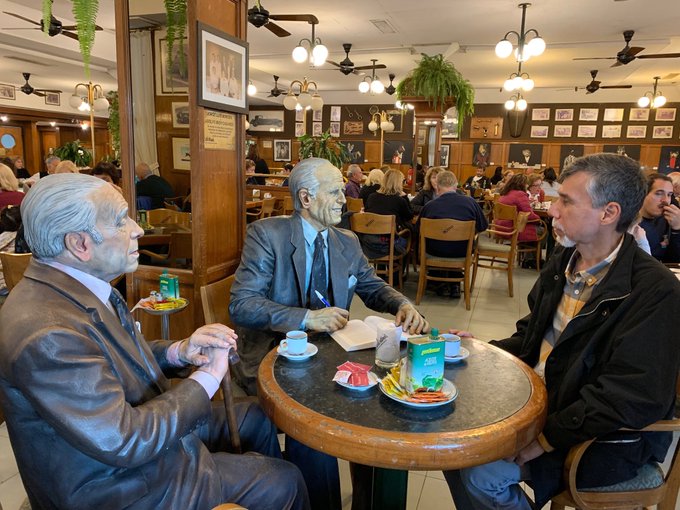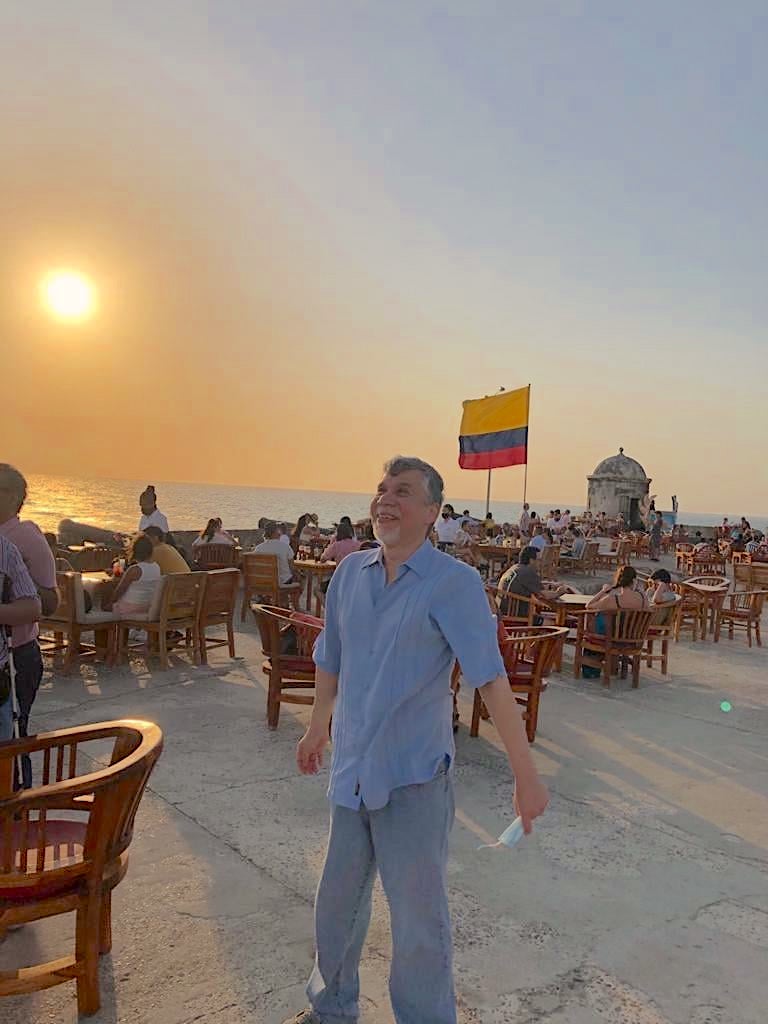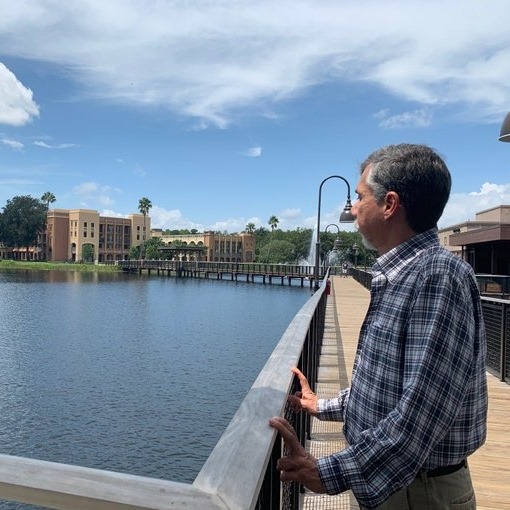Dean Lermen, legacy of an educator
By Juan Manuel Londoño Moreno
We had a chance to sit down with Dean Lermen for a short chat. Dean has a long and rich history advocating for the rights of people with disabilities. As part of the Latin American Blind Union, he participated in the negotiation of the UN Convention on the Rights of Persons with Disabilities (CRPD). Throughout his career, Dean has been an advisor to the Colombian government on public policies, human rights, the rights of people with disabilities, labor inclusion, and audio description. In fact, he was the Director of the National Institute for the Blind (INCI) in that country. Dean has been Dicapta's advisor since 2005.
Throughout his childhood, Dean lived in various parts of Colombia. He is the son of a marriage between a liberal thinker mother and a father who is fond of motors and automobiles. Of the many places he has lived in, he told us that the one that marked him the most is Cali.
The joy and emotion that I get every time I arrive in Cali are very strong. It overwhelms me.
There, I made a friend who I love dearly, Apolinar Salcedo, with who I talk about football. Many times when I got to Cali on the first flight, the one at six in the morning, he would send me a car, and we would have breakfast together. Our favorite breakfast is pandebono (a type of cassava bread) with a black coffee that, in Colombia, we call "tinto."

What was a day like in the life of Dean in high school?
I read a lot. I am the son of a mother who was a reader. She read stories to us, and she instilled in me that value from a very young age. For me, it was very interesting to reach the second to last grade of high school, where, in Colombia, we learn universal literature. It was very exciting to get to that course and realize that I had already done all the scheduled readings.
At that time, to evaluate your reading comprehension, you were asked things like a book's main and secondary characters. The professor doubted that I had read all the books, so he chose The Picture of Dorian Gray and asked me questions about that novel. I remembered by heart the outline of that book. Thanks to that, I was exonerated from literature.
Another time, at school, we formed a student council, which was very politically influenced. We had all kinds of activities organized by students and teachers, including sports activities, theater, and culture. I always participated in that.
How did your journey to blindness begin?
I once wrote that I began to abandon the light. That was in childhood, during my school-age years. But my mom made a very smart and wise decision: I never left school. I continued attending classes and alternated them with eye surgeries.
The vision loss was due to a mistake by the first ophthalmologist, who misdiagnosed it. He did not take the existing symptoms seriously, and the disease evolved freely. I can't tell you the exact date when I went blind.
Dean explained how he continued to live his life after losing his vision. His first describers were his brothers and his mother. He told us how they would sit together to watch television, and his family would describe what was happening.
In college, his second descriptors, as Dean calls them, were his classmates.
How did you decide to enter the field of social communication? Was it because of the reading tradition?
If you can believe it, I wanted to be a lawyer from Colombia's National University because the law fascinated me more than literature, poetry, or theatre. My mother wanted me to attend college, but not at the National University. She imagined that I was going to end up wasting time between strikes and student demonstrations. So I chose communication a bit randomly. Anyway, I already had quite strong links with Externado University.
But what made my decision to stay at the Externado final was meeting Daniel Coronell. On the first day of class, I ran into him. We shared a desk and became very good friends.
From there, Dean told us, life gradually gave him opportunities. He tried to set up a news media company with his university classmates, had a radio newscast, and faced the difficult task of competing with institutional media.

You also had several opportunities to work in public administration.
My first job with the national government of Colombia was at the press office of the National Institute for the Blind general division. I worked there for almost a year. I had the opportunity to meet with various political leaders in the country and raise the issue of disabilities.
From there, the door opened. I joined public administration and spent around 11, 13 years there. Later, I went to the university to work as a professor.
Blind people and people with low vision in Colombia had a very strong social movement at the end of the 70s, influenced by the student movement. Student leaders from colleges and high schools connected, and we had grave and deep grievances with the President. We went on strike, and the national government responded with the police. It was a very serious matter.
My connection to social movements began there. Later, as General Director of the National Institute for the Blind, I began interacting with the international movement and the Latin American Union of the Blind. I have been in this international relationship for 31 years.
Over these last 20 years, I have worked more with international organizations. We have done many awareness workshops.
You once told us that people should not be sensitized, that human beings are sensitive. Can you explain this philosophy?
I am the son of a teacher, and I know what education means because I lived it as a student and teacher. I think that the processes happen through education, not through sensitivity.
People are sensitive to blindness. Blindness is not indifferent to you. It touches you, often on the emotional side. That leads people to treat people with disabilities as little children or, worse, babies. People want to hug you and protect you.
But people also come into conflict because their emotions are contradictory. Just as blindness draws your attention, it generates resistance and fear, and that is difficult to handle.
So, when it comes to blindness issues, sensitizing first is not the expression. We should educate people, make them rational. This process is fundamental so that people get rid of their fear of blindness because fear of blindness leads to fear of the blind.
How do you get to Dicapta?
My work with audio description starts in a particular way in my life. My first challenges were in college when I first looked at film and television professions.
That is where the first challenges appear for me as a communication student. When my teachers, for example, have me do an essay for the film course final project. I have to sit down and describe a movie with Daniel Coronell.
That's when I entered the logic of audio description. I saw the movie Koyaanisqatsi, which has no dialogues, only music and images, about four or five times. My film teacher was simply fascinated and puzzled by the work I handed him.
So when the description projects appear, I think I'm in the place that I should be. It's like a Russian doll, the matryoshka, you open one, and there is another one inside. You open a door, and you spend a while there. Then, you open another door and spend awhile there. In the end, you kind of have a lot of open doors and a lot of open mirrors, and inside all those open doors and mirrors, Dicapta appeared.

It is a process that is actually spectacular because the idea of integrating a team that works harmoniously on the audio description processes, having very interesting conversations and mutual learning, is novel.
The Dicapta project is closely linked to educational television in Spanish. So, a lot of elements coincide again. From the level of production, art, aesthetics, and culture, we intervene in many forums. In that sense, the work of María Victoria has been impressive.
It is fascinating to have maintained a project of this sustainability in Spanish with resources from the United States of America for so long.
After many years of playing soccer, Dean now spends his spare time reading and watching movies. Sunday mornings for newspapers and conversation are sacred to him.
